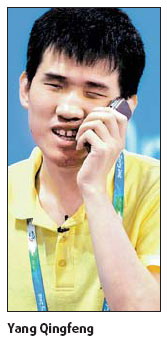A guide stick usually lasts at least a couple of years. But his has worn out in just a few days.
There is good reason for that, though. The ground Yang Qingfeng has covered as a radio journalist at the Beijing Paralympic Games is perhaps more than what he has during the rest of his 26-year life.

"I've never walked so much in my life. Normally, a guide stick can be used for years, but last night I noticed its bottom was gone," said Yang, the first accredited visually impaired Chinese reporter covering a sports event, yesterday.
Yang and Xie Yan are working for the Beijing One Plus One Culture Exchange Center, a non-profit organization run by physically challenged people. Xie, the director, founded the center in March 2006.
Like true professionals, Xie and Yang began their Paralympics' coverage a year ago, with the one-year countdown gala for the Games and the Good Luck Beijing International Goalball Tournament in September last year.
Yang and three of his colleagues became China's first disabled reporters to cover an international event, the 2007 Special Olympics in Shanghai, last year.
But the biggest show for Yang and Xie was the Paralympics opening ceremony. That evening, the two and six of their colleagues broadcast a three-and-half-hour live show on their website, sharing the show with hundreds of their visually impaired friends.
And since then they have been running between the venues, interviewing athletes and collecting as much first-hand material as possible for their editors.
"We are so busy that we can manage to have just one meal a day," said Xie, paralyzed since 2003 because of bone cancer.
Besides their own radio program, they also work for Beijing TV Station, producing a daily show: Paralympic 1+1.
Though new to such a big event, Yang knows well what he is doing and has been working on the subjects his listeners would be most interested in: goalball, five-a-side football and judo, events in which the visually impaired take part.
"I play goalball myself and know what it's really about," Yang said. And since the game is not telecast, he and his colleagues broadcast it live by putting an audio recorder close to the court.
"No need for any commentary. Our listeners can enjoy the game just by listening to the sounds," Xie said.
Friday was Yang's day, so to say, for China's visually impaired swimmer Xie Qing won the S11 women's 100m freestyle. "We were so excited just to be there we recorded everything, the national anthem, the interview and the press conference," Yang said. "I even asked Xie Qing to describe what the gold medal felt like."
"At that moment, I felt the spectators in the Water Cube were cheering not only the champion, but me too they were cheering all the disabled people When the country's 1.3 billion people start talking about the Paralympics and share their passion, it is a giant leap forward in our social development."
Xie Yan had another moment to cherish on Friday: a meeting with Kenya's famous visually impaired marathon runner Henry Wanyoike. "We had a very friendly talk, and Henry asked us to help donate the used sticks and Braille writing boards to the visually impaired people of his country."
"We now plan to ask people to help our friends in Kenya through our website," Xie Yan said.
The message won't be lost.